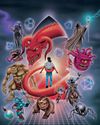The star of Broadways Torch Song was worried about being typecast in gay rolesbefore he realized there were so many different kinds.

IN HIGH SCHOOL, Michael Urie used to do an exaggerated “gay voice” as a joke. It was sibilant and effeminate, but in suburban Plano, Texas, in the early ’90s, where nobody would admit to knowing anyone who was gay, it got laughs. Urie was good at the gay voice—it was “really an extension of myself, I realize now”—and he liked the attention it got him, until one popular girl laughed too hard and told him, “You’re too good at that.” “It wasn’t an insult,” Urie remembers, but a sort of warning: “You can do that, and you can be really good at that, as long as you’re straight.”
Urie, now 38 and in rehearsals for the Broadway revival of the landmark gay drama Torch Song, tells me the story over a pitcher of Blue Moon at a beer garden in Astoria. He has an upbeat energy that recalls a silent-film star and an ability to make things funny even when they’re not. We’d made plans to dance at the so-called silent disco the beer garden will host later, where music is played only through headphones. But first we’re here to discuss a character who never would have listened to that girl in class.
Torch Song is a condensed version of Harvey Fierstein’s trilogy about a down-on-hisluck drag queen named Arnold (originally played by Fierstein) that first opened on Broadway in 1982. Arnold is effeminate and unapologetic—he demands to be loved, to have his own family, to wear bunny slippers whenever he likes. Written before the aids crisis came into view, Torch Song is both a memory of a time gone by and a vision of an alternate future, where the kind of love Arnold imagines might be possible. “There’s something very therapeutic for me playing Arnold, who has very little shame,” Urie says.
Diese Geschichte stammt aus der October 1, 2018-Ausgabe von New York magazine.
Starten Sie Ihre 7-tägige kostenlose Testversion von Magzter GOLD, um auf Tausende kuratierte Premium-Storys sowie über 8.000 Zeitschriften und Zeitungen zuzugreifen.
Bereits Abonnent ? Anmelden
Diese Geschichte stammt aus der October 1, 2018-Ausgabe von New York magazine.
Starten Sie Ihre 7-tägige kostenlose Testversion von Magzter GOLD, um auf Tausende kuratierte Premium-Storys sowie über 8.000 Zeitschriften und Zeitungen zuzugreifen.
Bereits Abonnent? Anmelden

LIFE AS A MILLENNIAL STAGE MOM
A journey into the CUTTHROAT and ADORABLE world of professional CHILD ACTORS.

THE NEXT DRUG EPIDEMIC IS BLUE RASPBERRY FLAVORED
When the Amor brothers started selling tanks of flavored nitrous oxide at their chain of head shops, they didn't realize their brand would become synonymous with the country's burgeoning addiction to gas.

Two Texans in Williamsburg
David Nuss and Sarah Martin-Nuss tried to decorate their house on their own— until they realized they needed help: Like, how do we not just go to Pottery Barn?”

ADRIEN BRODY FOUND THE PART
The Brutalist is the best, most personal work he's done since The Pianist.

Art, Basil
Manuela is a farm-to-table gallery for hungry collectors.

'Sometimes a Single Word Is Enough to Open a Door'
How George C. Wolfein collaboration with Audra McDonald-subtly, indelibly reimagined musical theater's most domineering stage mother.

Rolling the Dice on Bird Flu
Denial, resilience, déjà vu.

The Most Dangerous Game
Fifty years on, Dungeons & Dragons has only grown more popular. But it continues to be misunderstood.

88 MINUTES WITH...Andy Kim
The new senator from New Jersey has vowed to shake up the political Establishment, a difficult task in Trump's Washington.

Apex Stomps In
The $44.6 million mega-Stegosaurus goes on view (for a while) at the American Museum of Natural History.